Paul Hardy (illustrator)



Paul Hardy (baptised David Paul Frederick Hardy) (2 August 1862 near Bath, Somerset - 2 January 1942 Storrington), was an English illustrator, well known for his regular illustrations in The Strand Magazine and his painting of Canterbury Pilgrims (1903), and his drawings were associated with the serials of the writer Samuel Walkey (1871-1953). Paul was the son of David Hardy, also an artist, as was his grandfather, all from an old Yorkshire family.
Early life and education[]
Paul Hardy received his education in Clifton, West Yorkshire. He settled in Chelsea, London in 1886, and married in 1888, whereupon he moved back into the country, living at The Cottage, Church Street, Storrington.[1][2] He designed and made the original galleon weathervane, now kept inside St Mary's church in Storrington.[3]
Paul was the son of David and Emily Hardy. He was married to Ida Mary Wilton Clarke Hardy (1862 - 1955) on 28 July 1888 at St. Matthias, Earl's Court, in Kensington and Chelsea, London. His son was Brigadier Gordon Paul Umfreville Hardy (1894-1974), who married Sophia H. Dickinson in 1917.
Work[]
Hardy exhibited at the Royal Academy in 1890 with His Majesty Henry VIII visits Sir Thomas More at Chelsea and again in 1899 with There it befell, that as they rode near a forest, they saw a damsel and her dwarf sore distressed.[4] These are the only Royal Academy Exhibition works attributed to Hardy up to 1905.
Hardy was a skilled metal worker and made his own replica armour. He was an advisor to both the Armoury Department at the British Museum and to the Auctioneer Sotheby's. In recognition of his work as a black and white artist, and his contribution to the study of medieval arms and armour, he was granted a Civil List pension of £80 in 1932. This was followed by a Royal Academy pension of £50 seven years later.[5]
Hardy illustrated at least 170 books in his career,[6] and was equally prolific with magazines. One of the juvenile magazines he regularly drew for was Chums, which he produced illustration for from 1896 to 1940, over 40 years.[7] One book that Hardy illustrated was The Story of Susan by Alice Dudeney (1903). (Hardy's affair with Alice Dudeney contributed to the separation of the Dudeneys in 1913)
Authors whose work was illustrated by Hardy[]
The authors whose work Hardy illustrated include the following (based on the list provided by Kirkpatrick):[8]
- William Harrison Ainsworth (1805 – 1882), an English poet and historical novelist who published nearly 40 novels and wrote juvenile fiction for magazines.
- Jane Austen (1775 – 1817), an English novelist known primarily for Pride and Prejudice and her five other major novels that have hardly ever been out of print since first published.
- R. M. Ballantyne (1825 – 1894), a prolific Scottish author of juvenile fiction and an accomplished water-colourist.
- Honoré de Balzac (1799 – 1850), a French playwright and novelist who is regarded as one of the founders of realism in European literature
- George Borrow (1903 – 1881), an English writer of travel books and novels. The Romani people feature strongly in his works
- Sheila E. Braine (1867 – ), Shiela Emma Braine, an English journalist, song-writer, and author of books for young children.[9]
- F. S. Brereton (1872 – 1957), who wrote tales of Imperial heroism for children.
- Charlotte Brontë (1816 – 1855), a poet and novelist and the eldest of the three Bronte Sisters.
- John Byron (1723 – 1786), a British Royal Navy officer and explorer. He wrote about his experience of shipwreck.
- Jennie Chappell (1857 – ), a prolific author of fiction, accounts of women in the work-place, and juvenile fiction[10]
- Maria Louisa Charlesworth (1819 – 1880), an English author of religious books for children and religious tracts.
- Wilkie Collins (1824 – 1889), an English playwright, short -story writer and novelist best remembered for The Lady in White and The Moonstone
- Hendrik Conscience (1812 – 1883), a Belgian novelist who published over one hundred novels, and is best known for his romantic nationalist novels
- Susan Coolidge (1835 – 1905), Sarah Chauncey Woolsey, an American author of juvenile fiction including What Katy Did
- Darley Dale (1848 – 1931), Francesca Maria Steele, an English novelist who wrote both non-fiction under her own name and fiction under the pseudonym Darley Dale[11]
- Arthur Conan Doyle (1859 – 1930), a British writer and medical doctor, now best known as the creator of Sherlock Holmes
- Mrs Henry Dudeney (1866 – 1945), Alice Louisa Dudeney (née Whiffin), an English writer who published over fifty volumes of fiction.
- Alexandre Dumas (1802 – 1870), a French writer best known now for such titles as The Three Musketeers
- Mary Ellen Edwards (1862 – 1908), a British painter and illustrator who drew for young children. Also known a Mrs Freer, and by her married name Mrs. John C. Staples[note 1][12]
- Evelyn Everett-Green (1856 – 1932), who moved from pious stores for children, through historical romances, to adult romances under a range of pseudonyms.
- George Manville Fenn (1831 – 1909), a prolific author of fiction for young adults.
- Henry Frith (1840 – 1917), a prolific Irish author and translator for many of Jules Verne's novels.
- Bret Harte (1836 – 1902), an American short-story writer and poet.
- G. A. Henty (1832 – 1902), a prolific writer of boy's adventure fiction, often set in a historical context, who had himself served in the military and been a war correspondent.
- Thomas Hughes (1822 – 1926), an English lawyer, judge, politician, and author, now best remembered for semi-autobiographical Tom Brown's School Days (1857)
- Victor Hugo (1802 – 1885), A French poet, dramatist, and novelist, who is now best remembered for Les Misérables, (1862) and The Hunchback of Notre-Dame (1831)
- Leigh Hunt (1784 – 1859), James Henry Leigh Hunt, an English poet, critic, editor, and essayist
- Raymond Jacberns
- Henry St John (1869 – 1926), Charles Henry St John Cooper, a prolific English author of juvenile fiction for both boys (as Henry St John) and girls (as Mabel St John) among other pseudonyms.[13]
- David Ker (1841 – 1914), an English journalist, traveller, soldier, and author of juvenile fiction, who based the action in his stories on his own hair-raising experiences.
- Henry Kingsley (1830 – 1876), an English novelist, editor, and war correspondent, a brother to Charles Kingsley.
- W. H. G. Kingston (1814 – 1880), who wrote boy's adventure fiction.
- Robert Leighton (1858 – 1934), a Scottish journalist, editor, and a prolific author of juvenile fiction and non-ficiton books about dogs and their care.
- Edward Bulwer Lytton (1803 – 1873), Edward George Earle Lytton Bulwer-Lytton, 1st Baron Lytton, an English politician and Writer who first used the opening line It was a dark and stormy night.
- Bessie Marchant (1862 – 1941), who wrote adventure fiction featuring young female heroines, sometimes used the pseudonym Bessie Comfort.
- Frederick Marryat (1792 – 1848), a Royal Navy officer who wrote adventure books for children.
- Dorothea Moore (1881 – 1993), an English actress, wartime nurse's aide, and the author of more than sixty works of juvenile fiction including both historical fiction and school stories.[14]
- Georgina Norway (1833 – 1915), who wrote adventure fiction for children as "G. Norway".
- D. H. Parry (1868 – 1950), David Harold Parry, who also wrote as Morton Pike and Captain Eilton Blacke, a prolific English writer of serial stories and other juvenile fiction, wrote for Chums from 1892 to 1935, from a family of painters and a painter himself, was an expert on the Napoleonic Wars.[15]
- Mary E. Ropes (1842 – ), Mary Emily Ropes
- Walter Scott (1771 – 1832), the Scottish historical novelist, poet, and historian who wrote Ivanhoe.
- Gordon Stables (1840 – 1910), a Scottish medical doctor in the Royal Navywho wrote boys' adventure fiction.
- Grace Stebbing (1840 – 1936), a prolific author of moral tales for boys and girls as well as historical romances and biographies. She wrote her first book aged 7 and her last one at 91, with 89 books in total as well as numerous short stories.[16][17]
- Samuel Walkey (1871 – 1953), a Cornish senior bank official who turned to writing boys stories to occupy him while travelling for work.[18]
- May Wynne (1875 – 1949), a prolific author of formulaic juvenile fiction, mostly animal and school stories who also wrote some adult historical fiction, with nearly 200 books in total.
Example of story illustration[]
Rogues of the Fiery Cross was Samuel Walkey's (10 July 1871 – 29 March 19)[19][20] second serial novel. It appeared in Chums in the 1896 – 1897 volume and it was a huge success. It was illustrated by Hardy, as was almost all of Walkey's subsequent work in Chums.[18] After appearing in Chums Rogues was almost immediately published as a book by Cassell & Co., London in 1897 with sixteen full-page illustrations, as shown below:

I caught him by the collar

One caught me roughly by the throat
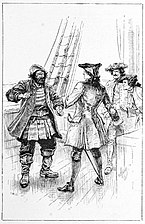
He drew a knife

His sword came swinging down
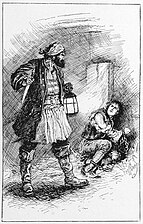
Turn over- he cried

A ship lay in the lagoon
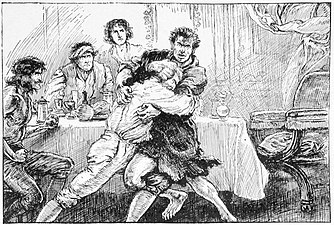
The two hurtled up and down

He wore a ceaseless grin

They burst up the stairs
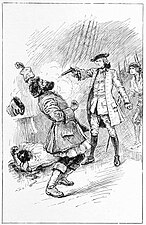
He drew a pistol and pulled the trigger
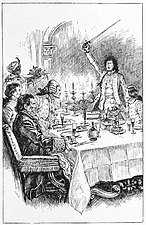
He flung his rapier round and round

He stabbed the second man

The Dutchman fought with desperate fury

The heavy wood dropped backwards

My fathers hands were tight upon his throat
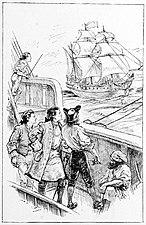
The ship came nearer and nearer
Assessment of Hardy[]
Peppin says that Hardy was a prolific illustrator of adventure stories, particularly in Magazines. Hardy paid attention to historical detail including the rigging of ships and period costume. He maintained a collection of period costumes for his models to wear for his illustrations.[7] Houfe notes that Hardy was one of the artist's whose work proprietor George Newnes had on display in his two-room gallery at the office of The Strand Magazine.[21] Houfe also provides an image of the Art Gallery.[22]
Houfe states that Hardy is at his best in costume romances and adolescent series. . . Overall, he considers Hardy A prolific but unexciting purveyor of adventure.[23] However, Kirkpatrick quotes Brian Doyle in his Who's Who of Boys' Writers and Illustrators (1964) as saying that: Hardy’s work was at once distinctive and accomplished. The villainous characters who formed his pirate crews were faithfully portrayed and completely authentic, as were the nautical details of the old-fashioned ships he drew ... His characters invariably had staring eyes, turned-down mouths and were seldom inactive or in repose.[5] Cooper, who rarely comments on the quality of illustrations in the titles he is cataloguing, refers to Hardy's illustrations as Stylish.[24] The ultimate compliment is probably the way in which Chums, who had a huge stable of illustrators, kept using his work for over 40 years.
Notes[]
- ^ Although Kirkpatrick gives a title by Mary Ellen Edwards as having been illustrated by Willian Rainey. This seems unlikely as she was an illustrator herself.
References[]
- ^ john adcock. "Yesterday's Papers: Illustrators of the Strand". Archived from the original on 2014-04-13. Retrieved 2014-04-12.
- ^ "David Paul Frederick Hardy (1862 - 1942) - Find A Grave Memorial".
- ^ "The Storrington and District Museum - Famous Residents". Archived from the original on 2014-04-13. Retrieved 2014-04-12.
- ^ Graves, Algernon (1905). "Hardy, Paul: Painter". The Royal Academy of Arts: A completed Dictionary of Contributors and their work from its foundation in 1769 to 1904. III: Eadie to Harraden. London: George Bell and Sons. p. 389.
- ^ Jump up to: a b Kirkpatrick, Robert J. (1905-07-11). "Paul Hardy". The Men Who Drew For Boys (And Girls): 101 Forgotten Illustrators of Children's Books: 1844-1970. London: Robert J. Kirkpatrick. p. 197.
- ^ Kirkpatrick, Robert J. (1905-07-11). "Paul Hardy". The Men Who Drew For Boys (And Girls): 101 Forgotten Illustrators of Children's Books: 1844-1970. London: Robert J. Kirkpatrick. p. 196.
- ^ Jump up to: a b Peppin, Bridget; Micklethwait, Lucy (1993). "William H. Rainey (1852-1936)". Dictionary of British book illustrators : the twentieth century. London: Murray. pp. 138. Retrieved 2020-04-28.
- ^ Kirkpatrick, Robert J. (1905-07-11). "Checklist of Books Illustrated by Paul Hardy". The Men Who Drew For Boys (And Girls): 101 Forgotten Illustrators of Children's Books: 1844-1970. London: Robert J. Kirkpatrick. pp. 198–203.
- ^ "Author: Sheila E. Braine (born 1867)". At the Circulating Library: A database of Victorian Fiction 1837-1901. 2019-12-31. Retrieved 2020-05-13.
- ^ "Author: Jennie Chappell (born 1857)". At the Circulating Library: A database of Victorian Fiction 1837-1901. 2019-12-31. Retrieved 2020-05-13.
- ^ Kemp, Sandra; Mitchell, Charlotte; Trotter, David (1997). "Wynne, May". Edwardian Fiction: An Oxford Companion. Oxford: Oxford University Press. pp. 425-426.
- ^ Kirkpatrick, Robert J. (1905-07-11). "Checklist of Books Illustrated by Paul Hardy". The Men Who Drew For Boys (And Girls): 101 Forgotten Illustrators of Children's Books: 1844-1970. London: Robert J. Kirkpatrick. p. 198.
- ^ Lofts, William Oliver Guillemont (1970). "Cooper, Charles Henry St John". The Men Behind Boy's Fiction. London: Howard Baker. pp. 103. ISBN 0093047703. Retrieved 2020-05-13.
- ^ Kemp, Sandra; Mitchell, Charlotte; Trotter, David (1997). "Moore, Dorothea (Mary) (1881-1933)". Edwardian Fiction: An Oxford Companion. Oxford: Oxford University Press. pp. 283.
- ^ Lofts, William Oliver Guillemont (1970). "Parry, David Harold". The Men Behind Boy's Fiction. London: Howard Baker. pp. 262-263. ISBN 0093047703. Retrieved 2020-02-07.
- ^ "Fashionable and Personal". Sevenoaks Chronicle and Kentish Advertiser (Friday 28 February 1936): 10. 1936-02-28.
- ^ "Wills and Estates". The Scotsman (Thursday 21 May 1936): 13. 1936-05-21.
- ^ Jump up to: a b Lofts, William Oliver Guillemont (1970). "Walkey, Samuel". The Men Behind Boy's Fiction. London: Howard Baker. pp. 340. ISBN 0093047703. Retrieved 2020-02-07.
- ^ National Archives (1939-09-29). 1939 Register; Reference: RG 101/6818FD: E.D. WFJA. Kew: National Archives.
- ^ "Wills and Probates 1858-1996: Pages for Walkey and Year of Death 1953". Find a Will Service. Retrieved 2020-05-05.
- ^ Houfe, Simon (1978). "Fin de Siecle Magazines". Dictionary of British Book Illustrators and Caricaturists, 1800-1914. Woodbridge: Antique Collectors' Club. pp. 183. Retrieved 2020-05-05.
- ^ Houfe, Simon (1978). "Figure 83: Image of The Strand Magazine Art Gallery in 1892". Dictionary of British Book Illustrators and Caricaturists, 1800-1914. Woodbridge: Antique Collectors' Club. pp. 182. Retrieved 2020-05-05.
- ^ Houfe, Simon (1978). "Paul Hardy". Dictionary of British Book Illustrators and Caricaturists, 1800-1914. Woodbridge: Antique Collectors' Club. pp. 333. Retrieved 2020-05-05.
- ^ Cooper, John (1998). "Florence Coombe. British". Children's Fiction 1900-1950. London: Routledge. p. 12.
External links[]
![]() Media related to Paul Hardy (illustrator) at Wikimedia Commons
Media related to Paul Hardy (illustrator) at Wikimedia Commons
- Works by Paul Hardy at Project Gutenberg
- Paul Hardy at the Internet Speculative Fiction Database
- Paul Hardy at Library of Congress Authorities, with 7 catalogue records (previous page of browse report as 'Hardy, Paul, 1862-')
- Rouges of the Fiery Cross online at The British Library
- English illustrators
- 1862 births
- 1942 deaths
- English male artists
- English children's book illustrators
- British children's book illustrators
- 19th-century English painters
- English male painters
- Magazine illustrators
- People from Storrington
- People from Bath, Somerset















